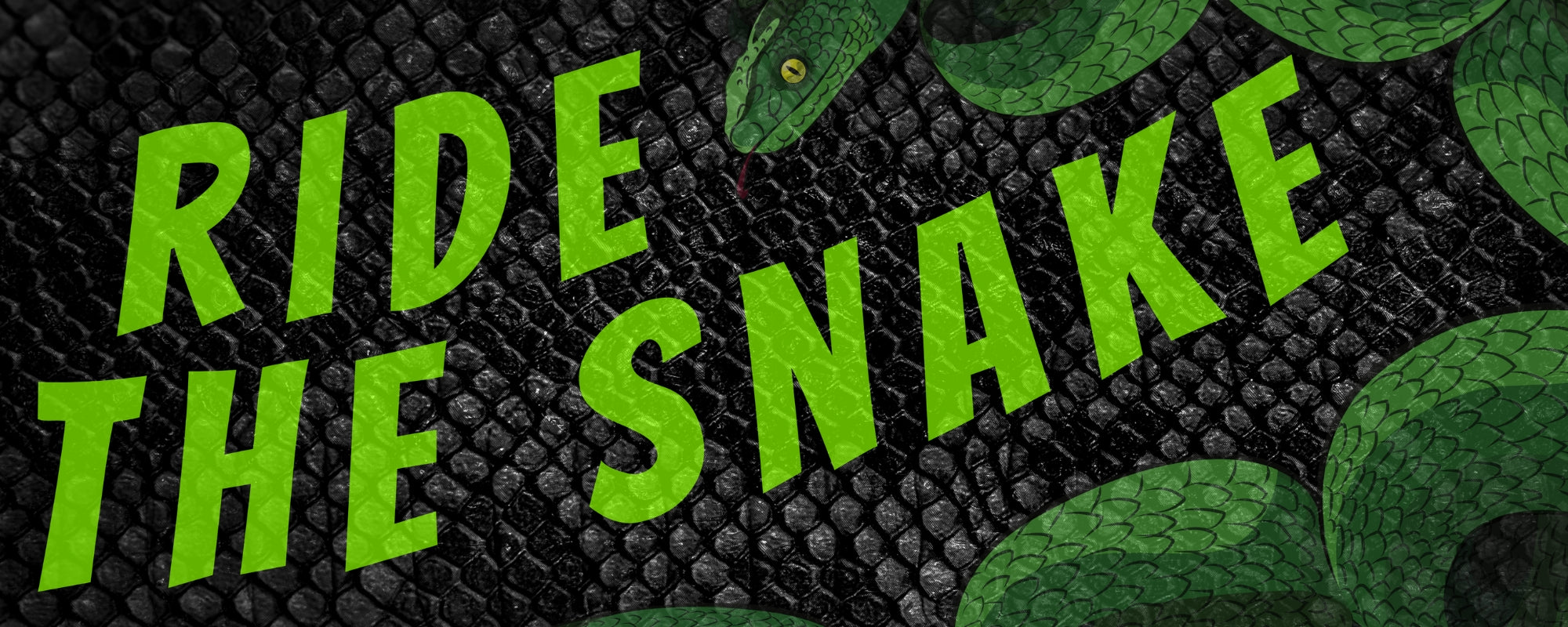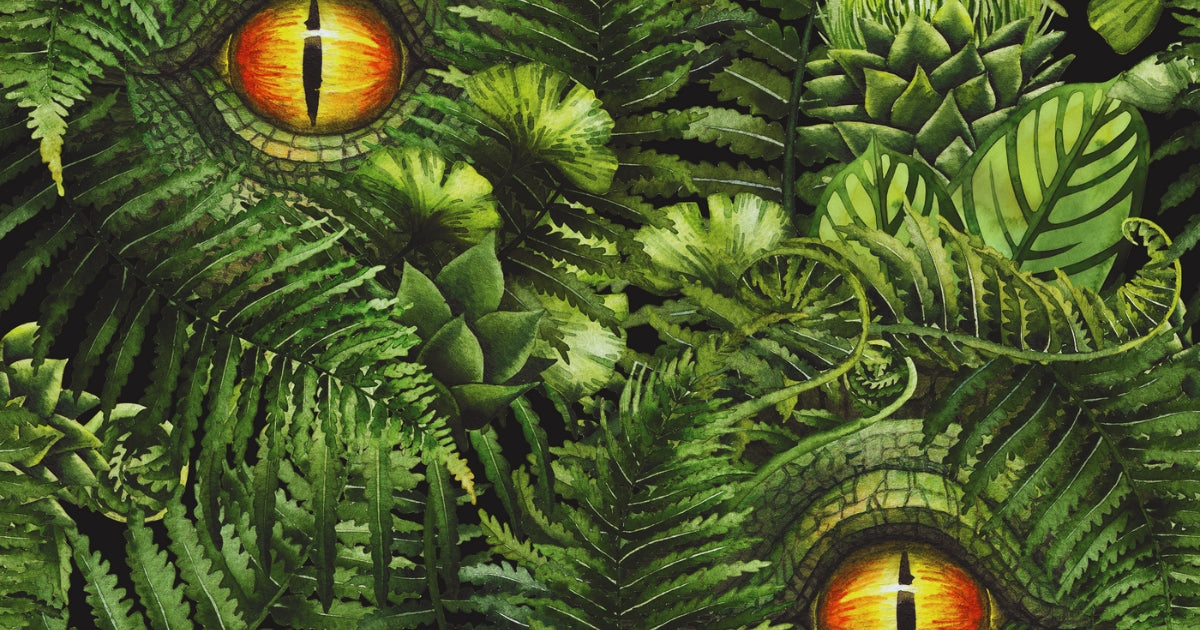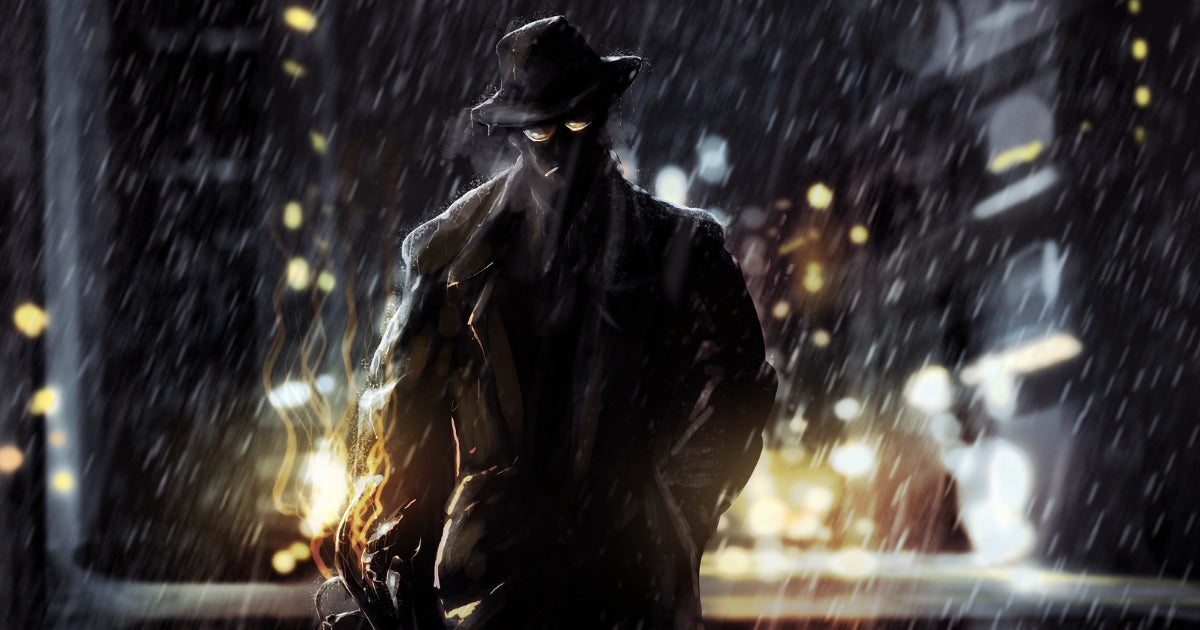

Ride the Snake
By Claudine Griggs
Audio Narration by Loretta Chang
The children were regimented from morning until night, as were their parents, for the governing elders discovered long ago that scripted routines diminished all varieties of excess and deficiency. Today, however, a citizen of the fourth grade at Huxley Academy would become singularly distinct during an encounter with one of thirteen remaining South American anacondas.
“Boys and girls,” said the announcer, as the children entered the climate-controlled tropics around the center stage of an intimate auditorium, “please take your seats.”
Forced hot air brushed the children’s faces. Ancient continental birds and insects sang from hidden speakers. And the overall effect made one of the students think of a hellish fable from ancient literature.
“Listen to nature’s discord,” said the soft-spoken male announcer. “Notice the uncomfortable warmth and humidity. Imagine aboriginals plagued by disease, famine, and ethnic warfare. These early Amazonians—we can’t really call them men and women—struggled for food and shelter, sometimes murdering others in the process. These early hominoids fared hardly better than domesticated animals.”
The surround sound suddenly wailed with New World primates, buzzed with wasps and mosquitoes, and growled with a South American jaguar. The children squirmed in their seats, but one precocious boy, age nine, bolder than the rest, whispered, “The Stone Age. Do not fear a dead past.”
The announcer heard through his earpiece and responded. “Yes, boys and girls. Modern civilization has conquered nature and the baser impulses of its dominant species. Social unification has created security and abundance, and we no longer have with us the poor, the halt, and the blind. But today, this purposeful day, you shall witness a palpable demonstration of the modern versus the ancient.”
The children shrieked with delight, and then, with side glances, internally questioned the propriety of such exuberance. However, they did not ponder this long or deeply, because the main event rolled onto the stage: a thirty-foot anaconda, sixteen inches in diameter at midsection, which lay in a glass enclosure lined with straw, a lavishly protected creature whose only hardship was boredom. The children oooh’d and aaah’d, knowing that they were safe now, but that seven hundred years ago, the Amazonians were not. How odd, and how glorious.
After waiting for the squeals and whispers to taper, the moderator swept his arm across the crowd of one hundred and one children. “And now,” he proclaimed, “someone will be allowed a personal encounter with our reptilian guest. ONE of you shall revisit living antiquity. Do I have a volunteer?”
The credentialed orator, ten credentialed teachers, and ten credentialed assistants had to wait less than a second. Every child’s hand shot into the air. “Me! Me! Me!” reverberated through the auditorium, small arms swaying for attention.
The moderator waited a prescribed length of time, pacing back and forth across the stage, smiling, gesturing toward the serpent, then the audience, and then the serpent once more. The excitement became thunderous.
“ME! ME! ME!”
Finally, he pointed to a girl, age seven, not quite as strong or pretty as the rest, but just as enthusiastic. She yelped and bounced toward the artificial meadow, glancing at her teacher to be assured the bounce was permissible.
A hidden directional microphone automatically swiveled toward the child, now standing twelve feet from the beast’s enclosure. “And what’s your name?” asked the announcer.
“Malika Oleander Principle,” said the girl. “I stand for unity and abundance.”
“Well, Malika,” said the moderator, “are you ready for a unique experience? Something your classmates will admire?”
“Yes!” said Malika.
“Do you think you can handle it?”
“Oh, yes!” shouted Malika.
“Then,” said the moderator to his audience, “let’s watch bold Malika confront the ANA-CON-DA!”
This time, the children jumped and screeched without glancing at their teachers, and none was louder than Malika. She had been selected for special treatment. How odd, and how glorious.
“Are you ready!?” asked the announcer with carnival cadence.
“We are ready!” said Malika, shoulders back, as if society depended on her.
The anaconda began to test the enclosure, looking for an expected opening, and one hundred children vocalized their astonishment. It lived.
“Malika,” said the announcer, “we recommend silence as you face the serpent.” The command was unnecessary, because when a transparent panel slid away from the cage, Malika was paralyzed with a strange and distinctly unpleasant sensation. She had never experienced fear before.
Recognizing the child-scented air, the anaconda glided to the floor. It was much larger than the children imagined.
Malika stared motionless as a forked tongue flicked the air. At first, the serpent turned in the direction of the announcer, who flashed a corrective laser across its brow. The head then snapped toward the girl, followed by one hundred gasps of air.
“The anaconda is a mindless primitive,” said the moderator. “Malika is not. What do you think will happen?”
Malika did not know the answer, but she was civilized, all right. She belonged to the One Society of a Golden Age.
The snake inched toward the child. Seven feet away. Then five. A spotlight focused between Malika and the anaconda, and then the creature laid eyes upon the girl.
With jungle quickness, the beast struck, sinking ancient teeth into the modern shoulder of a forty-five-pound child. Malika screamed as no one outside the auditorium had screamed in seven hundred years. The serpent coiled the child to center stage while Malika kicked and cried for help. The other children watched in obedient silence.
Malika began choking on half words, and the snake constricted as hard as the springs of an Auschwitz boxcar. Soon there was no sound, no breath, no heartbeat from the child. Then began a reptilian swallow that seemed to last for hours; and finally, as the last edge of Malika’s left sole passed into the snake, the auditorium went dark for ten seconds. When the lights came up, the serpent, cage, and child were gone.
Speech slowly returned to the children, and the brave, precocious boy asked, “What happened to Malika?”
“She is with the anaconda,” said the announcer.
“But she’s all right?” suggested a girl, confused.
“Malika is dead,” replied the announcer.
“That can’t happen,” said the boy. “This is some kind of trick!”
The other children nodded and began to giggle, suspecting an
elaborate hoax.
“But where is Malika?” asked another, still unsure.
“I told you,” said the announcer. “Malika died. Do you doubt your eyes?”
Now the children were distraught. What had they seen? They looked to their teachers, who offered no immediate clue about today’s lesson.
“Impossible!” declared the courageous boy, standing.
“It is possible,” replied the announcer, “for the good of the majority—and with consent of the martyr…and her parents. Surely you understand the concept of sacrifice. You studied it in first grade.”
The boy looked skeptical. “I think you’re lying, Mister!”
His teacher cast a sharp glance. “You may never speak that way to an Overseer!”
The boy did not back down. He liked Malika and felt a curious protectiveness toward her. “If he isn’t a liar,” said the boy, cocking his head with illicit independence, “why did Malika scream and fight?”
The teacher smiled, nodding at the announcer, who in turn smiled at the audience.
“Boys and girls,” said the speaker. “Our Doubting Thomas apparently believes that Malika, a daughter of the Golden Age, was as primitive as the serpent, concerned merely for her own existence.”
The audience was silent.
“Well?” asked the announcer. “Was she?”
“No,” said several children unconvincingly.
Another asked, “But, sir, why did she cry? It was awful!”
The announcer gestured with outstretched palms covered in Malika’s blood. “To offer a more realistic demonstration, that you might truly understand the benefits of our civilization. Boys and girls, Malika died for you. Each of you.”
Sighs of relief filled the auditorium, followed by high-pitched giggles as the children began to understand. That was the lesson. To make them question the wisdom of their superiors. The notion was as preposterous as it was shaming, a fool’s illusion generated by lack of faith in the One Society.
A girl laughed. “You played a trick!”
Another child smiled at her teacher. “This was the best field trip ever!”
“In the future,” said the announcer, compassionately, “I hope you will doublethink before mistrusting our governors. And if you are ever confused, you might, at minimum, remember and honor the memory of Malika Oleander Principle, whose unselfish community spirit was demonstrated so compellingly this day.”
The children broke into spontaneous applause, reinforced by the teachers. After a few moments, they began to chant. “Ma-lee-ka! Ma-lee-ka! We love Ma-lee-ka!”
The Overseer smiled. He bowed stage left, right, and center, repeating the cycle until the ovation began to diminish. Then he panned the audience, offering his applause to the children, who cheered themselves.
“We’re the One! We’re the One! We’re the One!”
Beneath the auditorium, a resting serpent sensed the vibrations of a Golden Age. And in the audience, a very special young boy smoldered with revolutionary understanding.
Copyright © 2021 Claudine Griggs
The Author

Claudine Griggs
Continue reading

Subscribe to our newsletter
Promotions, new products, and sales. Directly to your inbox.



